01 – Vision Behind the Standards
Founded in 2007, the Woodwork Career Alliance is the first neutral association to award Credentials to woodworkers. Accredited Skill Evaluators are an essential part of the process.
- Individuals may apply for or be nominated by Members of the WCA board, or associated industry partners, to be an evaluator.
- All evaluators will be required to agree to a professional ethics agreement.
- Evaluators must complete a training process which includes a face to face component.
- Evaluators shall respond to regular updates to maintain active status.
- Evaluators will complete a self-assessment of their skills and will be authorized to perform skill assessments and issue stamps for the tools/operations in which the WCA determines s/he is qualified.
- Evaluators may be skilled tradespersons, machinery technicians, production supervisors, woodworking educators, or anyone possessing expertise in the skills being evaluated and meeting the WCA criteria.
WCA Skill Evaluators
Skill Evaluator candidates must submit an Evaluator Application, and provide the following:
- Any credential (diploma, certificate, license) that pertains to their qualification
- A resume of employment in the woodworking industry or woodworking education
- Three references that affirm the candidate’s skill set
- List of tools/machines for which competence is claimed, as a part of typical “data collection” for the Application for Skill Standards Evaluator.
Transition:
You have the desire to become a Skill Evaluator. If you’ve already met the criteria above, continue your journey to accreditation by continuing the Lesson Pages.
- The ultimate responsibility for operations, tool/machine maintenance, and the actions of the candidate are the responsibility of the educator or employer.
- The actions and recommendations of the Skill Evaluators are theirs alone.
- Updates and improvements in the Skill Standards will take place. Notice will be published in Trade Press and on the WCA website. it is the responsibility of the Skill Evaluator to ensure s/he is using the latest edition of the WCA Skill Standards.
The Standards are defined in 2 Levels:
Level 1 is Output oriented.
This might be seen as Entry Level skills. This person would be able to safely produce wood parts using machines and tools that are set-up and ready for them. They can produce parts to specification, but are not expected to have in-depth knowledge of the tools or machines they are using. Safe working procedures are stressed here.
Level 2 is Setup oriented.
We could call this Intermediate skill level. The woodworker at this level will have greater knowledge of the machines and tools they are using and will be expected to complete their own setups and tool preparation. Given plans and specs, they will be able to select and use jigs and fixtures and use appropriate materials to complete the task.
(beyond Level 2) Machine Specialist and Area Specialist.
This person has Advanced skills. The final criteria for this Certificate are still being developed. The objective is to reward a person with in-depth knowledge about a specific machine or set of machines.
Relation of Tool Points to Levels
Every “level” of every “operation” qualifies as a Tool Point. On a particular Tool/Machine and Operation, most people will pass Level 1 and Level 2 at the same time. That means they spend two Assessment Credits and earn two Tool Points. As you will see in the Credentialing section, it only takes 30 Tool points to earn the Green Credential. That could be done in as few as 15 operations.
Continue to learn more about how Tool Points translate into the actual Credentials.

